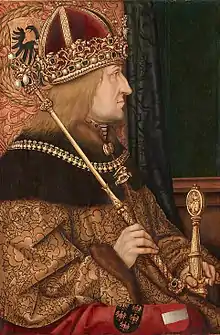1440 imperial election
The imperial election of 1440 was an imperial election held to select the emperor of the Holy Roman Empire. It took place in Frankfurt on February 2.

Burgkmair the Empire
Background
Albert II of Germany, King-elect of Germany, died on October 27, 1439. The prince-electors convened to replace him were:
- Dietrich Schenk von Erbach, elector of Mainz
- James of Sierk, elector of Trier
- Dietrich II of Moers, elector of Cologne
- Louis IV, Elector Palatine, elector of the Electoral Palatinate
- Frederick II, Elector of Saxony, elector of Saxony
- Frederick I, Elector of Brandenburg, elector of Brandenburg
The throne of Bohemia was vacant. Albert was king of Bohemia and his firstborn son Ladislaus the Posthumous would not be born until February 22.
Elected
Frederick III, Holy Roman Emperor, duke of Styria, Carinthia and Carniola and regent of Austria, was elected.
Aftermath
Frederick III was crowned in Rome by the pope on March 19, 1452. He was the lineal ancestor of all subsequent emperors of the House of Habsburg.
This article is issued from Wikipedia. The text is licensed under Creative Commons - Attribution - Sharealike. Additional terms may apply for the media files.